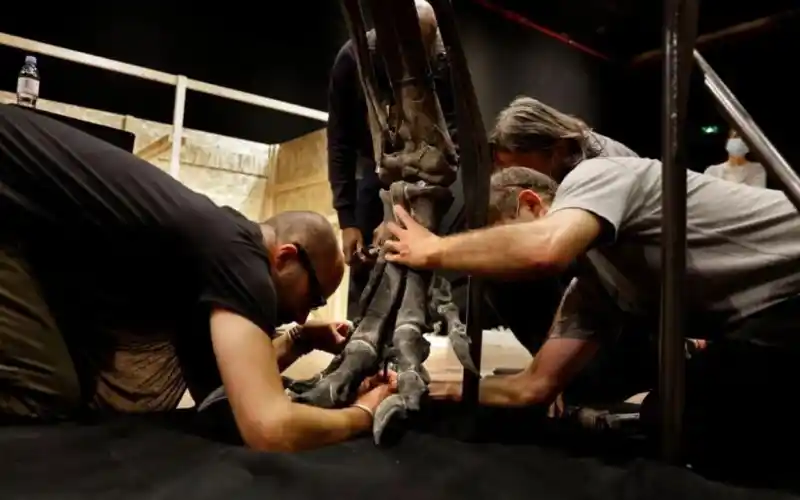Many amazing plants and animals that once roamed the globe are now extinct. However, in the form of fossils, they left some remnants and fragments of their existence. These primordial fossils provide us a glimpse into the planet. Paleontology is a subject worth studying if you want to learn more about ancient plants and animals.
Paleontology is the study of prehistoric life, which includes dinosaurs as well as prehistoric plants, animals, fish, insects, fungi, and even bacteria.
In this post, I’m delighted to share a list of the top 15 paleontology undergraduate programs from across the world. See the table of contents for further information.
What Is The Undergraduate Paleontology Program?
Paleontology is a dual undergraduate major that needs extensive knowledge and instruction in both biology and geology. Paleontology and its applications are utilized to solve geological difficulties.
The majority of paleontologists in today’s globe rely on the fossil record to piece together the story of life in the context of a changing planet, establishing a link between modern and previous ecosystems. Paleontology is frequently mistaken with archeology, a closely related science that studies human activities and civilization.
Paleontologists frequently spend their time on the job, digging for fossils or collecting specimens to enhance their laboratory work. They may find and preserve evidence of animals and plants, as well as fossil bones and other information, and then utilize the knowledge to draw conclusions about life’s evolution throughout the planet’s history.
In general, certain colleges and institutions, particularly in America, do not provide a formal undergraduate paleontology curriculum. The course is, nevertheless, available as a subfield in geology, earth science, and biology.
Why Should I Pursue A Paleontology Degree?
In this difficult economic climate, you might wonder why the government, universities, and museums are interested in paleontology research. Is paleontology still important today? When compared to other scientific research, does it have any value?
Paleontology is concerned with the study of the evolution of life. Paleontology allows us to place living animals in both evolutionary and geographical frameworks since the history of life is enshrined in the fossil and geological record. This aids our understanding of the significance of living creatures’ traits and the occurrence of biological processes in the modern world.
A paleontology degree will provide you with a solid theoretical and methodological foundation in paleontology, as well as a solid grounding in geology. It broadens your understanding of life’s evolution and geological changes. Working with the academic research team on the latest theories and models within the paleontology department is another benefit of studying paleontology. You will be able to apply your expertise gained as an undergraduate student in a variety of scientific occupations such as oil exploration and museum curating.
What Can You Do With An Undergraduate Paleontology Degree?
You must realize that you are not alone if you want to pursue a career in paleontology. There are more than a million other people who want to get a degree in this subject. The desire to become a paleontologist is frequently sparked in infancy. Unfortunately, most people’s aspirations peter out over time. This could be attributed to a number of troubling circumstances, including low income and limited career possibilities for paleontologists. It means that more eager people who are on their way to realizing their childhood aspirations in this profession are needed.
Government, nonprofit, and private funds are used to fund the majority of scientific research. As one might imagine, the most well-funded scientific studies are those that benefit mankind the greatest. Medical knowledge, military capabilities, and other commercially advantageous research are all aided by such studies.
Despite this, paleontologists with a bachelor’s degree can find work in a variety of sectors. Within paleontology, there are several areas of specialty, including:
Paleobotany
This is the study of plant fossils over geological time periods. Paleobotanists repurpose materials in order to classify changes in plant evolution and environmental change over time.
Paleoecology
This is the study of ecosystems that are rebuilt using data from a variety of lifeforms found within a geological structure. It reveals how the ecosystem is maintained and the interrelationships that exist between creatures.
Micropaleontology
This is related to the study of micro fossils, which would involve the use of a microscope for investigation. This field provides information on the presence of microorganisms in a given environment in order to provide data for climate science, evolution, and archaeology study.
Paleobiogeography
This is the study of how living things are dispersed geographically. By monitoring variations in the earth’s crust, scientists can classify speciation throughout the universe.
Paleoclimatology
This is the study of climate before human measurements became available. This research into former climates aids in raising awareness of current developments and their effects on ecosystems.
A paleontologist can also work in a variety of settings, including colleges, universities, gas and mining firms, museums, and historical exhibitions. They may even go across the country or around the world in search of fossils to preserve for future research. Professors, museum personnel, science journalists, television researchers, and stratigraphers are all jobs associated to paleontology.
According to the Bureau of Labor Statistics, geoscientists’ jobs are predicted to expand by 6% between 2021 and 2028. This increase in growth rate could be attributed to the United States’ growing demand for environmental preservation and energy management.
What Are the Prerequisites for a Paleontology Undergraduate Program?
Starting early on the route to become a paleontologist is the best way to go. Children’s skills can be strengthened by reading simple science books appropriate for their age groups. Students in high school can pursue both math and science seriously to have a broad understanding of relevant topics in this profession.
If you want to spend your days stitching together old bones, developing museum exhibitions from fossils, or even discovering why and when dinosaurs existed, you’ll need a degree. However, as previously stated, there are no schools that provide a paleontology undergraduate degree.
How Long Does It Take To Finish An Undergraduate Paleontology Program?
An undergraduate program in paleontology takes an average of four years to complete. However, because most jobs in this sector need experts to have a master’s or doctorate, it will take between 6 and 8 years for a master’s degree and 4 years for a PhD to become a fully qualified paleontologist. Remember that you will need to devote some time to gaining some amount of work experience.
How Much Does It Cost To Get An Undergraduate Paleontology Degree?
In the United States of America, the average tuition prices for colleges providing paleontology programs for the academic year 2020/2021 are $8 243 for in-state residents and $16 772 for out-of-state students.
How Much Money Can You Make With An Undergraduate Paleontology Degree?
According to the Bureau of Labor Statistics, paleontologists can earn around $90,000 per year on average. A paleontologist’s income is determined by a number of things, including their location, the sort of work environment they operate in, and the industry they work in.
How Can I Get A Paleontology Undergraduate Degree?
A significant academic background in biology, anthropology, environmental engineering, geography, or geology is required to become a paleontologist. Many biology, geology, and paleontology programs need you to have completed curriculum in modern languages, mathematics, chemistry, and physics. To traverse modern paleontology, you’ll also require statistical analysis and computer skills.
What Are The Requirements For A Paleontology Undergraduate Program?
To qualify for an undergraduate program in paleontology, you need to satisfy the following:
- Knowledge of specific subjects like; Biology, Chemistry, Mathematics, Further Mathematics, Computer Science, Environmental Science, Geography, Geology, Marine Science, and Psychology.
- Undergo a pre-professional study time of 1 year
- A minimum of 3.0 GPA on a 24 unit course weight is necessary.
What Are the Top 15 Undergraduate Paleontology Programs?
The best 15 paleontology undergraduate programs are listed below:
1 University of Alberta Paleontology (Bachelor of Science)
The Faculty of Science at the University of Alberta offers a paleontology program. The Faculty of Science is noted for its high-quality programs that examine, illuminate, and investigate the actual science behind human challenges.
Paleontology is an interdisciplinary program that aims to provide students with a good foundation in paleontology, earth sciences, and biological sciences, as well as prepare them for entry-level professions and graduate school.
Students have access to leading experts, extensive collections and digs, bone, and the opportunity to practice professional experience through this curriculum, which is of world-class caliber. The study of fossils and ancient life forms is the focus of the program.
Tuition: ARS 22 125 per year
2 University of Birmingham Paleontology (BSc)
The University of Birmingham is a top 100 university in the world and a member of the prestigious Russell Group. It is a public research university with a reputation for graduating students who are highly employable and successful.
Paleontology at the University of Birmingham allows you to comprehend the evolution and diversity of ancient life, from dinosaurs to microfossils, by analyzing fossil records. You will also be given the skills you need to advance your career as a professional paleontologist. You can expect to participate in fieldwork training in palaeobiological and geological techniques both in the UK and abroad, in addition to lectures and classroom experiences.
Tuition: £23 400 per year
#3 Flinders University
Flinders University is the only Australian university that offers a dedicated paleontology undergraduate degree that combines lab and fieldwork from Biological and Environmental Sciences, Archeology, and Visual Arts.
A Bachelor of Science degree from the university will provide you a thorough understanding and appreciation of the Australian fossil record, as well as a solid foundation in the scientific principles that govern paleontology and related fields.
Flinders University boasts Australia’s largest paleontology team, with six professors and more than 25 researchers.
Tuition: $36 500 per year
#4 University of Bristol
Through the study of geology and biology, a Bachelor of Science from the University of Bristol equips you with understanding of the evolution of life on this planet. The multidisciplinary degree gives you a broader perspective on palaeobiological science and technological growth.
In addition, the quantitative research conducted by the department will help you build tremendous mathematical and statistical skills.
Tuition: £15,750
#5 Department of Geology and Geophysics – Yale University
As a result of its greater resources, excellent academic programs, and sophisticated research facilities employed in carrying out their instruction, Yale University’s Department of Geology and Geophysics is one of the top interdisciplinary programs for earth science.
For their work and achievements in the promotion of earth science, several of the previous and current academic members have substantial credibility.
In addition, the program incorporates several parts of earth scientific disciplines such as chemistry, physics, geology, and biology. As a student, you will almost certainly graduate with the appropriate degree of expertise in this field.
Tuition: $55,500 per year
#6 Department of Geology – University of Cincinnati
The University of Cincinnati’s Department of Geology is regarded as one of the best among the school’s top programs. The undergraduate program is meant to help students develop and improve their talents so that they may become top leaders in their chosen fields.
Students participate in extensive fieldwork all over the world to get a hands-on grasp of the subject. With their advanced technology, the department’s laboratories have become one of the greatest places for students to get hands-on experience.
Tuition: $26,994 per year
#7 University of Portsmouth
According to NSS, the University of Portsmouth is an award-winning university that ranks in the top 30 in the UK for student satisfaction (2020). It is a cutting-edge, multi-disciplinary university that offers practical undergraduate, postgraduate taught, and research courses.
The Bachelor of Science in Paleontology offers paleontology theory and methods, as well as a solid geological basis.
Fieldwork takes students to interesting places including the Isle of Wight, Lulworth Cove, Lyme Regis, and other portions of the Jurassic Coast World Heritage Site. The department’s always-ready researchers incorporate fresh ideas and data into instruction, giving students a significant advantage over their peers at other universities.
Tuition: £17,600 per year
#8 The School of Earth Science – Ohio State University
Ohio State University has continuously been listed among the top universities in several categories. It has been praised for using cutting-edge technology to educate its students, preparing them to be top professionals in their industries.
The university’s School of Earth Sciences is a research department that focuses on developing future leaders in its discipline. The department’s academic curriculum is continually evaluated to ensure that only current issues are taught.
Tuition: $32,061
#9 Paleontology – University of Oklahoma
In Norman, Oklahoma, the University of Oklahoma is a public research university.
The ConocoPhillips School of Geology and Geophysics at Oklahoma University teaches paleontology. Students are equipped to perform digs and are given the tools they need to assess the information acquired during the process. To get practical experience, the students work in the collections and laboratory of the Sam Noble Oklahoma Museum of Natural History. At the academy, they are given the opportunity to pursue their research interests while also completing the essential chores.
Tuition: $27,144
#10 Paleontology – University of the Witwatersrand
The University of Witwatersrand’s Wits Evolutionary Studies Institute (ESI) is Africa’s largest paleontological research institute. South Africa has a vast fossil past, making the University of Witwatersrand’s research center a fascinating place to pursue a career in the intriguing science of paleontology.
Paleontology at the University of Witwatersrand attempts to elucidate the development of life on Earth through the fossil record and other disciplines.
Tuition: R 50 920 per year
#11 Geology (BS) Paleontology – Appalachian State University
Appalachian State University is a public university and a University of North Carolina affiliate. It now has about 15900 students enrolled. Arts and Sciences, Fine and Applied Arts, Education and Business, and the School of Music are among the four academic colleges that offer study programs.
Paleontology at Appalachian State University will teach you about evolution and plate tectonics, sedimentation and sea-level change, water resources, and groundwater contamination, among other things. You will receive a Professional Geologist license (PG) upon graduation, a credential that will allow you to work in the field of geology.
Tuition: $7,410 per year
#12 Department of Geo-sciences – Virginia Tech
Virginia Tech is known for its academic and research excellence, which is reflected in its students’ professional development. Its multidisciplinary departments offer extensive degree programs.
The university’s department of Geosciences comprises a wide range of subjects that give students with the best academic knowledge and tools to help them succeed in their career aspirations. From the atomic level to the planetary level, students are given a thorough academic experience.
Tuition: $50,900 per year
#13 Paleontology and Evolution – University of Leicester
The University of Leicester is renowned for its academic and research excellence. It provides approximately 150 degree programs in 30 distinct topic areas.
Students at the Department of Paleontology and Evolution will have a broad understanding of life’s evolution on Earth. Experts in topics such as dinosaurs, fossils, and the genesis of the world pique their interest, allowing them to excel in respective fields.
Tuition: £9,250 per year
#14 Paleontology – University of Queensland
Paleontology at the University of Queensland has numerous advantages for you. Paleontology experts at the University of Queensland are constantly exploring marine and terrestrial ecosystems, as well as microbes. Not to mention that the researchers’ specific interests, such as Australian fossil corals, radiolarians, geomicrobiology, and many more, are always met.
Teachings, hands-on experience, and other activities can help you learn more about paleontology as an undergraduate.
Tuition: AUD 31,920 per year
#15 Paleontology – University of New England
The University of New England is one of the few Australian universities that offers a comprehensive paleontology undergraduate curriculum. It has a long history of paleontological research and education, and it is the ideal natural laboratory for studying fossils and evolution.
Paleontology is a multidisciplinary science curriculum at the University of New England that includes geology, biology, and some areas of chemistry. At UNE, students can also pursue postgraduate studies.
Tuition: $38,750 per year
Conclusion
A paleontologist is a scientist who analyzes the fossil record to learn about the evolution of life on Earth. Fossils are the remains of previous life on the planet, and they can be made from animal bodies or their impressions (body fossils).
References
- ucmp.berkeley.edu – Paleontology Education at Berkeley
- jurassicparkterror.net – Careers in Paleontology: Our Comprehensive Guide
- careermatch.com – Paleontology Degree: What to expect?
- collegetuitioncompare.com – Paleontology Program 2021 Average Tuition Costs
- indeed.com – How Much Does a Paleontologist Make? Average Salary, Skills Needed and FAQs







Leave a Comment